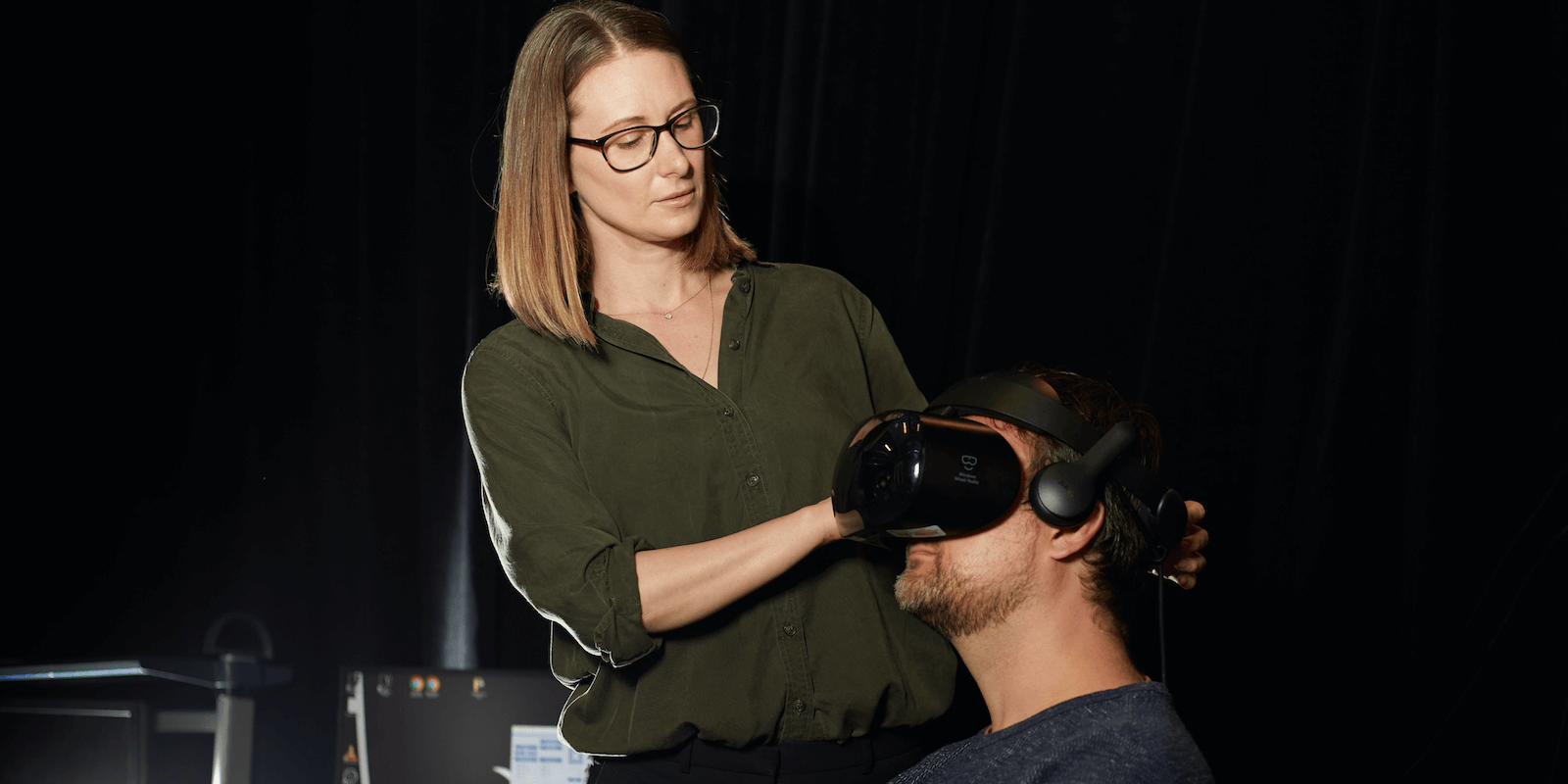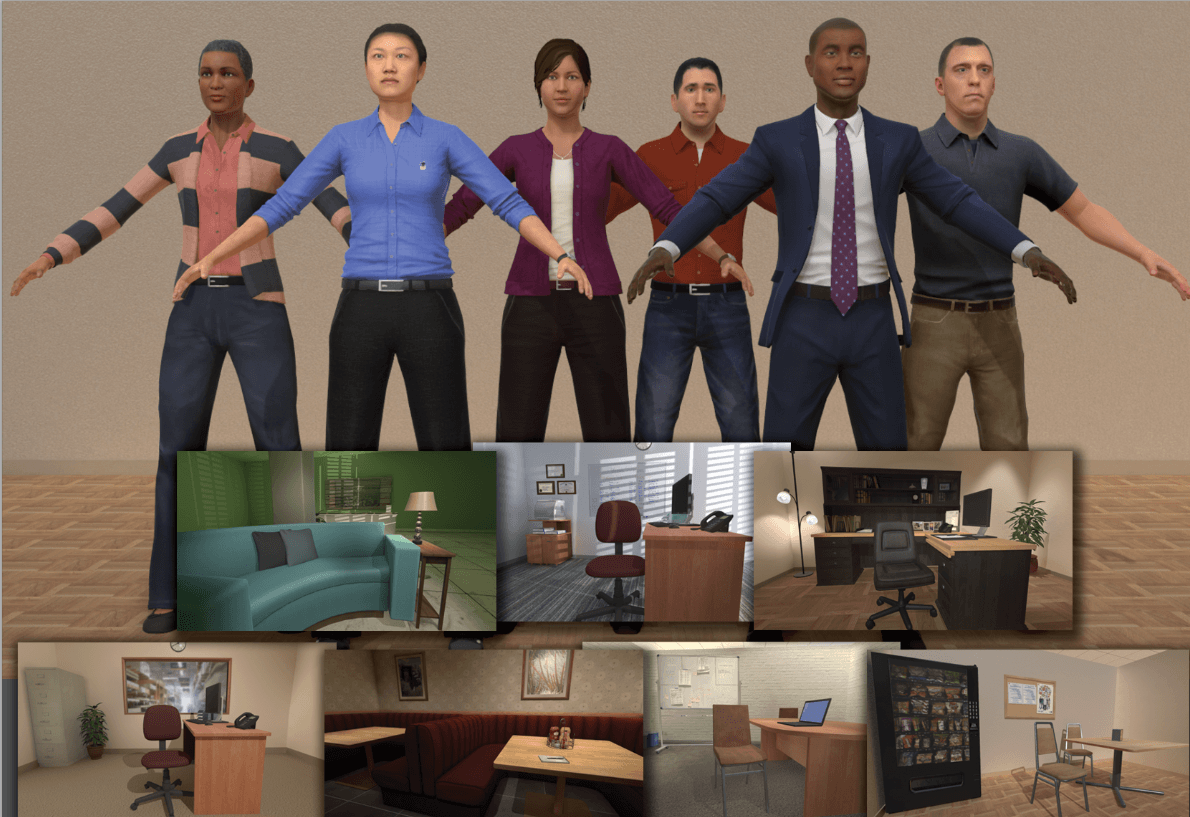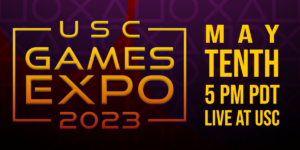
A demonstration of virtual reality goggles used to access the Virtual Interactive Training Agent platform. From left: Sharon Mozgai and Arno Hartholt. Photo credit: Justin Gilbert.
The job interview can be a terrifying ordeal. The anxiety and stress of preparing for it, especially if you have never done one before, stops many people from bringing their best self or even showing up at all.
It is also challenging to practice for. It is nearly impossible to simulate the exact circumstances of one without physically being in the hot seat.
Or is it?
The USC Institute for Creative Technologies (ICT) has been working on a tool that could change how we prepare for the interview forever. VITA, or the Virtual Interactive Training Agent, is an interactive virtual reality job interview practice system, designed to build competency and reduce anxiety in job interviews. Based on 15 years of research on anxiety and experiential learning, VITA enables participants to practice various realistic job interview scenarios until they are prepared for the real thing.
USC joined forces in 2021 with ICF and the Office of Community Services (OCS) at the United States Department of Health and Human Services to distribute VITA to low-income communities. As part of the national Community Economic Development (CED) program, local organizations are able to utilize VITA to provide interview training for their constituents.
VITA is the latest in an evolution of virtual humans created by the Virtual Human Toolkit, a flexible framework for humans and virtual humans to interact across a variety of settings. The Virtual Human Toolkit was first developed in 2013 by researchers at ICT and the USC Viterbi School of Engineering, including Arno Hartholt, David Traum, Stacy Marsella, Jonathan Gratch, Louis-Philippe Morency and Ari Shapiro.
One of the main goals of these OCS programs is to create new jobs and fill these jobs with individuals who have an immediate need of employment.
Sharon Mozgai
ICT is currently working with six CED grantee organizations across the country, including Chicanos Por La Causa, Inc., the Pacific Gateway Center, the Kentucky Highlands Community Development Corporation, Coastal Enterprises, Inc., the Economic and Community Development Institute, and the Northwest Side Community Development Corporation.
Originally developed by the ICT’s Skip Rizzo to reduce job interview anxiety and increase confidence in young adults with autism spectrum disorder, VITA was later adapted to serve veterans (VITA4VETS) and youth currently on probation (VITA Second Chance). In both instances, VITA provides a safe, simulated, environment in which users can repetitively practice job interviewing and develop the skills essential to closing the confidence gap so often experienced by under-resourced populations.
The system is designed to capture a variety of possible interview experiences. A participant can interview with six different virtual character interviewers, three male and three female, of varying ages and ethnic backgrounds. Each virtual interviewer can enact three interviewing styles: friendly, neutral, and hostile.
Even the setting can be changed to align with the user’s interview goal. There are seven different backgrounds to choose from, ranging from a business office to a warehouse break room.

Users of the Virtual Interactive Training Agent (VITA) can choose from various interviewers and settings to optimize their learning.
Users can interact with VITA on a standard personal computer monitor or via AR or VR goggles to be fully immersed in the experience.
Job interviews are ideally suited for technology-based practice because they generally take on a predictable structure. Interviews usually begin with introductory statements, and then lead to questions about the interviewee’s strengths, competences and ability to complete job-related tasks. VITA’s artificial intelligence system allows the virtual character interview to follow this framework and create a realistic interview scenario.
Participants in previous applications of VITA successfully improved their ability to identify personal strengths, advocate for themselves and answer situational interview questions. In their new partnership with the Office for Community Services (OCS), the ICT hopes that these successes can be shared by low-income participants across the country.
“One of the main goals of these OCS programs is to create new jobs and fill these jobs with individuals who have an immediate need of employment,” says Sharon Mozgai, the associate director for medical virtual reality at USC ICT and the lead for the VITA and OCS partnership.
If the initial program succeeds, ICT hopes to bring VITA to every single organization under the Community Economic Development umbrella, broadening its scope to lift up low-income citizens across the United States.
Published on October 4th, 2021
Last updated on October 4th, 2021










